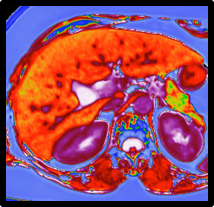Viral Hepatitis and Liver Disease

The NIHR Health Informatics Collaborative (HIC) Viral hepatitis and Liver Disease theme is collecting electronic health care records from people infected with viruses that predominantly affect the liver, to use in research for patient benefit.
Our main focus is currently advancing hepatitis B research. Chronic hepatitis B infection affects 254 million people globally and caused around 1.1 million deaths in 2022, primarily from cirrhosis and liver cancer (hepatocellular carcinoma [HCC]). We are leading a nationwide initiative, building on clinical expertise to collect and analyse mass real-world data from electronic patient records using multidisciplinary techniques (informatics, engineering, and analytics). This programme aims to understand the clinical trajectories and outcomes of HBV infection, including responses to antiviral therapy, development of advanced liver disease stage and liver cancer (HCC), and HBsAg loss.
We are also evaluating the impact of recently expanded treatment guidelines, the effectiveness of combination antiviral therapies, and examining how other health conditions (comorbidities) and metabolic factors affect disease outcomes. Additionally, we are investigating factors associated with care discontinuation. Hepatitis D virus (HDV) coinfection, which may worsen outcomes in people with hepatitis B, will also be characterised in terms of its prevalence in the UK and its impact on progression to severe liver disease. By informing intervention and care strategies, this programme is working towards better patient care and health outcomes for people living with hepatitis B in the UK and globally.
The NIHR HIC Viral Hepatitis Theme has developed a database of anonymised clinical data:
- to address important questions related to clinical outcomes in viral hepatitis
- to share clinical data to demonstrate its usefulness in clinical research
The database has been fully reviewed by the National Research Ethics Service.
Further Information
Lead centre
Oxford University Hospitals NHS Foundation Trust
| Name | Position | Organisation |
|---|---|---|
| Ellie Barnes | Chief Investigator | Oxford University Hospitals |
| Philippa Matthews | Clinical co-Lead | The Crick, UCL and Oxford University |
| Willian Gelson | Local Investigator | Cambridge University Hospitals |
| Stuart Flanagan | Local Investigator | Central and North West London |
| Graham Cooke | Local Investigator | Imperial College Healthcare |
| Stephen Ryder | Local Investigator | Nottingham University Hospitals |
| Alexander Stockdale | Local Investigator | Royal Liverpool and Broadgreen University Hospitals |
| Eleni Nastouli | Local Investigator | University College London Hospitals |
| Ahmed Elsharkawy | Local Investigator | University Hospitals Birmingham |
| Salim Khakoo | Local Investigator | University Hospital Southampton |
| William Bernal | Local Investigator | Kings College Hospital |
| Nicholas Easom | Local Investigator | Hull University Teaching Hospitals NHS Trust |
| Tingyan Wang | Senior Data Scientist | Oxford University Hospitals and Oxford University |
For research queries please contact Professor Ellie Barnes via orh-tr.nihrhic@nhs.net .
Publications
Electronic Health Informatics Data To Describe Clearance Dynamics of Hepatitis B Surface Antigen (HBsAg) and e Antigen (HBeAg) in Chronic Hepatitis B Virus Infection available on the American Society for Microbiology (MBio) website.
- This study on HBsAg and HBeAg clearance dynamics demonstrated that these markers may contribute to prognostication and patient-stratified care, and provide a foundation for advancing insights into mechanisms of disease control.
Bimodal distribution and set point HBV DNA viral loads in chronic infection: retrospective analysis of cohorts from the UK and South Africa available on Wellcome Open Research.
- This study shows a bimodal viral load distribution in chronic HBV infection, unlike the skewed normal distributions seen in chronic HCV and HIV infection, and provides evidence of a virological set point in untreated patients.
National Institute for Health Research Health Informatics Collaborative: development of a pipeline to collate electronic clinical data for viral hepatitis research. An overview of the paper can be found on the NIHR Oxford BRC website; full paper can be found on the BMJ Health and Care Informatics website.
- This paper presents a comprehensive methodology for the development and validation of a new data collection and management pipeline, and demonstrates that routinely collected clinical data captured in electronic patient record (EPR) systems across multiple sites can be collated, integrated, and made available for translational research.
Longitudinal Analysis of the Utility of Liver Biochemistry as Prognostic Markers in Hospitalized Patients With Corona Virus Disease 2019 available at Hepatology Communications.
- This study reports liver biochemistry is commonly deranged in hospitalised patients with COVID-19 in a UK population and shows that baseline hypoalbuminemia and rising ALP over time could be prognostic markers for death, with comparisons to a matched group without COVID-19.
Hepatitis B virus (HBV) viral load, liver and renal function in adults treated with tenofovir disoproxil fumarate (TDF) vs. untreated: a retrospective longitudinal UK cohort study available at BMC Infectious Diseases.
- In a comparison of tenofovir disoproxil fumarate (TDF)-treated vs. untreated patients, this study reported variable ethnicity distributions across the two groups, and some evidence for liver fibrosis progression in the untreated group, which warrants a need for further evidence for expanded treatment.
Impact of the COVID-19 pandemic on routine surveillance for adults with chronic hepatitis B virus (HBV) infection in the UK available at Wellcome Open Research.
- This study investigated service disruptions on routine surveillance of hepatitis B patients during COVID-19 pandemic, revealing that reduction in rates of surveillance closely track COVID-19 incidence and periods of population lock-down.
Cohort Profile: National Institute for Health Research Health Informatics Collaborative: Hepatitis B Virus (NIHR HIC HBV) Research Dataset available at International Journal of Epidemiology (IJE)
- This profile for the first time presents a national multi-site large HBV cohort of >6000 individuals with diverse ethnicities using routinely collected clinical data from secondary care in the UK, and a large majority of patients in the cohort had longitudinal measurements of relevant laboratory parameters, providing promising opportunities for translational research.
Patient Biochemistry and Treatment Need in Chronic Hepatitis B Virus Infection Across Three Continents: Retrospective Cross-Sectional Cohort Studies available at Infectious Diseases and Therapy
